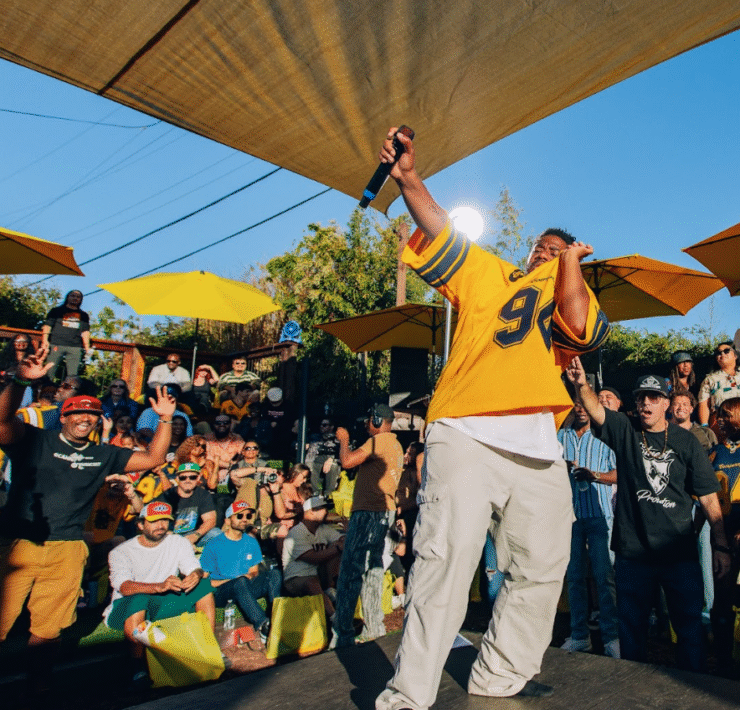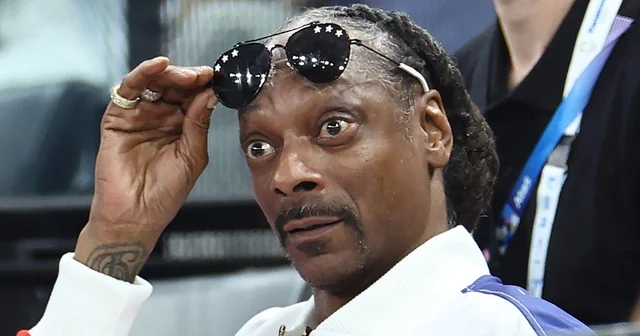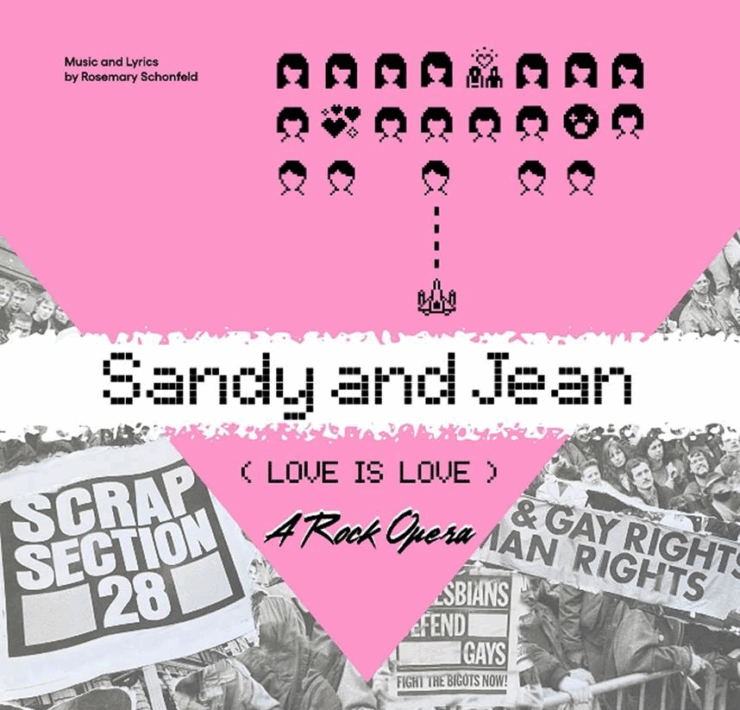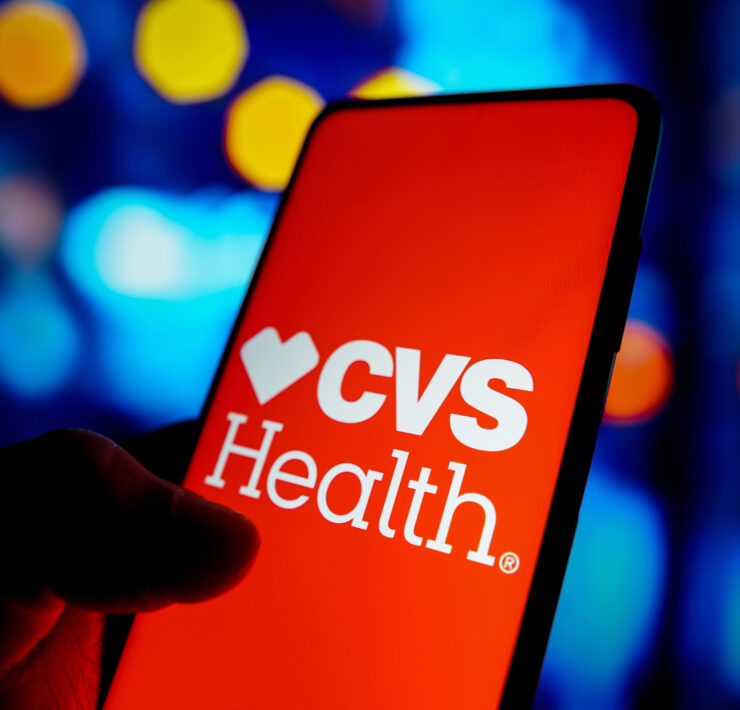Bryce Quartz: Making Hip-Hop Gay Again

Denny Patterson is a St. Louis-based entertainment and lifestyle journalist…
Known for his sick beats and controversial rhymes, Bryce Quartz is an openly gay cubby rapper who hopes to make an impact on the hip hop scene.
He has released tough and hard-hitting tracks like “Make America Gay Again” and “F.U. (Falwell University), but just last month, gave listeners the third and final volume of his American Queer trilogy, “Third Times A Charm.” The trilogy references Quartz’s three-fold experience of coming out, and the last installment includes his pinnacle of songwriting and creation thus far.
Quartz collaborated with RuPaul’s Drag Race alum Brita Filter and east coast bearded queen royalty KayKayLavelle before the 2020 election for a queer voting anthem called, “You Brita Vote, Kay?” The music video reached 40k in less than 24 hours and was featured in several LGBTQ media outlets such as Queerty, Instinct Magazine, and The WOW Report. Coming off the success of the collaboration, Quartz is happy that the final piece of American Queer is out, and he looks forward to accomplishing more while also helping his fellow queer artists.
OFM caught up with Quartz to talk more about American Queer, his use of abrasive lyrics, and how he hopes his art is also considered activism.
You recently dropped the final chapter of your American Queer Trilogy. How has it been received?
It has been received well. When I put it out, it felt like my birthday. Everyone was reaching out, listening to it, and showing love and support. Even though it was maybe 20-30 people, that is still a lot to me. Just the fact that people even care meant a lot to me. Overall, with it being the third and final piece, I am glad it is out because I wrote it like a year ago, and I am ready to put out new music. It’s old news to me. I am sick of it [laughs]. But it is a bit surreal that it is out, and I am glad people are liking it.

Can you tell us more about American Queer’s overall concept and inspiration?
When I started making music, I was inspired by Brockhampton, which is like a boyband started by Kevin Abstract. He is openly gay and inspired me to start rapping. They put out a trilogy, so I was like, why not? Fuck it. I’ll do three mixtapes. However, the big factor was that I came out of the closet three times. I came out and then put myself back in the closet, I ended up getting outed to my family and then went back in the closet, then the last time I came out was the third time. Third time’s the charm.
It is also kind of a path to my artistry in a way. When I first came out, it was messy. I came out to my mom around Christmas, and she could not look at me for like three days in the eyes. I felt like shit, and I was only 14. It was horrible. I hated them. I did not know what to do. So, my first mixtape is very messy and angry. I diss my family name in the first song I ever put out, and I talk about wanting to beat up homophobes. When Volume Two came out, I started to learn how to structure the songs more and write better.
The second time I came out, it was unintentional. My mom found my Tumblr or something like that, and it was bad news. So, I went back into the closet and suppressed my feelings. I wasn’t angry with my family, but I wanted to leave. I just wanted to leave my household. In correlation with Volume Two and my coming out story, I was more grounded. Like, it is going to be okay. I just have to get through it, but I also know what I am now doing and what kind of stunts I want to pull. I put out “F.U. (Falwell University), which is a diss track towards Liberty University. I filmed a music video on campus and burned my student ID on the founder’s grave, Jerry Falwell Sr. He blamed 9/11 on the gays and feminists, and that is why I did that. I also made a song called “Make America Gay Again” that is very anti-Trump and playing off his imagery and words.
Even though I had more direction with Volume Two, I was still loss and unsure of what I was doing. I was going to release Volume Three last June, but in April, I met Big Daddy Karsten. He started to mentor me and taught me how music works in the industry, how I should put things out to sell them, how to get press, how to build my imagery, and how to brand and market myself better. I ended up cutting seven songs from the final cut of Volume Three and took everything he taught me to basically evolve my content.
When I started, I was rushing things. I am not doing that anymore. Even when I came out, I wanted to rush it. I wanted to just come out, be gay, and have my parents just accept it. I did kind of force it on them very quickly, and I should have been more patient. Now that I am more patient and understand, I think Volume Three really speaks for itself. If you were to listen to Volume One and then to Volume three, you can hear the difference.

How did you fall into the world of rap and hip hop?
I used to listen to hip hop during high school around the first two times I came out. It’s funny because I used to be scared of hip hop. I just did not like it. When I moved out and started living out on my own, that is pretty much all I listened to for two years. When I discovered Brockhampton and heard one of Kevin Abstract’s lines in one of his songs about there are not enough gay people who rap, it resonated with me. There are a lot of gay people who rap, they are just not out. I was like, I want to do this. I can do this.
At a young age, when I was in middle school, I was in three bands. We performed in the talent shows, so I have always had a passion for music, but growing up, my sister always had a passion for music and my parents discouraged her from pursuing it. They were like, you will never make money doing it, so I always shut that part of my brain out until I moved out on my own and had to figure out what I wanted to do with my life. When I heard those lines from Kevin Abstract and had that realization, it just clicked.
I started writing my first lines, and one of the first songs I wrote, my nose started bleeding. I like screamed the lyrics. It was a hardcore trap metal rap song. After I recorded and listened to it in the car a million times, I do not know how to describe the feeling. It feels like this is my purpose, and that is what keeps me motivated. Every time I make a song, that is the feeling I want to achieve. This is what I am supposed to be doing. I for sure love this.
You are known for your abrasive lyrics. Can you talk more on your aggressive approach to writing?
On the first mixtape, I have some controversial lyrics. I diss my family name, and mind you, I recorded that song in my family’s house. So, that was fun. Anther song on the first tape is called “Candy Coated Broke Back Mountain Living Cinderella Militant Homo,” but it is an acronym. Somebody called me that on Facebook and threatened to kill me for being gay. So, I wrote song about killing straight cis people. That way, when I performed it, if there were any cis people in the audience, they would be like, why does he just want to kill straight cis people for no fucking reason? Well, underprivileged people and the LGBTQ community has to deal with that all the fucking time. That may not have been the best way to make someone check their privilege, but my point was to make you feel the way we feel. This kind of shit happens to minorities all the time.
When I put out Volume Two, like I said, I put out that video about Liberty University. I hated Liberty. I wanted to kill myself there. I owe them around $15k in student loans, but fuck them. Fuck what they stand for. I think Jerry Falwell Jr. just stepped down from president, so I am glad things are falling apart. I like to think I had a part in doing that. I was just so angry with them and I thought that would be iconic. Now, I view it as activist work. When I did that, I had the whole LGBTQ community, who I did not even know existed at Liberty, back me up. They added me to an underground Facebook group, and I gained dozens of fans just because of that video. They were like, we are really glad you said that. That is what I wanted. I wanted to say what everyone else wanted to say.
The same thing with “Make America Gay Again.” I just wanted to piss off Trump supporters. The song starts with me yelling, ‘Make America gay again, bitch!’ I want you to turn that song up as loud as you fucking can in a Walmart parking lot on your way out with the windows down so every conservative in that parking lot hears it. I just want to say the things that we are all thinking, and just have fun with it. Be campy.
Related article: Super Fresh Music Finds- February 2021
Being gay and a cub already makes you stand out in the hip hop industry. What are some other challenges you have personally faced?
COVID has definitely been a huge restraint on everything, but also, being an openly gay artist in general, it is very difficult to navigate the music industry. That is something we all think about as queer artists, and it sucks because we should not have to think about it. The second a cis straight listener finds out you are queer, or they hear a queer line in your song, it makes them cringe and they turn it off. That is why it is harder for queer people to get a wider audience because we are already fishing. It is already difficult unless you have a godly voice and great marketing.
Can you tell us more about these queer music showcases you run?
Before COVID, I was hosting live queer showcases that provides a safe space for queer artists to express themselves without the fear of judgement. I was expanding them into different cities, and I had originally been doing them for about 7-8 months only here in Greensboro. My goal was to book shows across the U.S. That way, whenever my queer friends wanted to play in a city or plan a tour, I would have the links. What I ultimately wanted to do was go to all these cities, do a showcase, book local queer artists, and then basically pass the torch. Say, now you are hosting this every month. Start that community in every city.
When I started making music, I wanted to perform live so bad. I love performing live, and I went to open mics, but there are some venues around here in Greensboro that would let artists perform who are transphobic and homophobic. They made those space not safe, so that is why I created this platform. I wanted to create a safe space for people like me to feel comfortable to perform. That was something that held me back at first, but instead of letting it hold me back, I was like, fuck that. I am going to do what I can to make that platform instead.
Hip hop has been known to be a homophobic and sexist genre. Do you think it is getting better for LGBTQ and female artists?
I certainly think so. My friend Hi Yello, who is on track seven, he was talking in an interview a couple weeks ago that in the beginning of the 2010s, the main female rapper was Nicki. There was nobody else who was mainstream getting number one hits as a hip hop artist. It was Nicki. Then, over the last four years, we have had more female artists like Doja Cat, Megan Thee Stallion, and so many more. I think that is going to happen this decade, and I think people before me like Big Dipper, Cazwell, and some of the queens on Drag Race who rap laid a foundation out.
Now that there are so many queer artists who are coming out with new shit all the time, we are kind of saturating the market. This is our time to shine. We are solidifying our spot in the industry, and the industry itself has changed over the last 10 years. It was more radio based and much harder to be an indie artist without a label, management, or a fuck ton of money. Now, you can do everything independently, and I think that is scaring labels. It is shaking the industry and paving the way for people like us to find our niche. A lot of queer artists will be able to make a living off of music, and that is exciting.
You would say your music is advocating for change?
Yes. That is my end goal platform and the background motives for everything. I want to lift up all my queer artist friends. I just started writing for Rock the Pigeon, which is Ryan Cassata’s music blog. I have been helping a lot of queer artists out there with submissions on SubmitHub and writing about music that I really like that is underappreciated to other venues and avenues. I just always want to help queer people out, no matter what it is. I cannot tell you all the details, but I make a lot of moves behind the scenes. I never post about it, but I try to help as many people as I can. I have sent a lot of people my press links, and my manager helps as well. Helping artists is my entire platform.
Outside of music, you are an advocate for cannabis. Why is cannabis important to you, and does it help with your creative process?
It can definitely help my creative process. I use cannabis because I have borderline personality disorder, and cannabis really helps mediate the extremes and the emotions with that. It helps me exist and do day-to-day things. It can help with my creative process, but sometimes, I do like to be sober when I am trying to be clever and write double entendres.
Do you have a preferred method?
I prefer to smoke blunts, but can’t afford to smoke blunts, so I smoke bowls. I do enjoy dabbing and I enjoy carts. However, carts are dangerous around here. I do not trust many people with carts. Stick to the greenery because it is easier to make sure you are not getting duped.
Related article: “Sunday, Someday” Celebrates LGBTQ, QTPOC Youth
Do you incorporate cannabis themes into your music?
I do. Probably too much [laughs]. One of the songs on Volume Three is called “All the Smoke!” I reference it there, and I have a song that was cut from Volume Three called “Nicotine and Weed.” It is goofy song, but it is like a lo-fi and chill. Very spacey. It was fun, and I do have a live performance of that song coming out in April.
Why is smoking weed such a hot topic when it comes to hip hop and rap?
I think because of the drug war and because of racism. I really do think that is it. Honestly, when I told my parents that I smoke weed, they were pissed. They grew up in the 80s, so to them, I am pretty sure my dad thinks weed is like heroin. They were just raised to believe that. That was literally what they were taught.
What are some future goals you hope to accomplish as an LGBTQ rap artist?
I want a number one, at least on iTunes. I would like to chart on Billboard, that would be cool, but I definitely want to start that international platform where I can help all my queer friends tour and perform. That is a huge goal of mine. I also want to act. I have written a couple TV pilots, and I just want to be a multimedia mogul. I do not want to stop at just rap. I have some songs where I sing too, but I am going to shoot for the stars. I have high dreams and want to do everything that is available to me.
Before we wrap up, are there any other upcoming projects or anything else you’d like to mention our plug?
Big Daddy Karsten, my rap mentor, has a single and bear mix coming out soon that is really dope. I have been listening to this demo for months, so I am glad that he is working with his label to put it out. So, be on the lookout for that, and I also have a single with him coming out. That is my next release, but that is later down the line. I have all kinds of things planned, so you never know what to expect this year from me. I will continue to evolve and make more projects.
To stay up-to-date with Quartz’s latest news and projects, follow him on Twitter and Instagram. Make sure to check out American Queer and his other music on YouTube, Spotify, and all other digital streaming platforms.
What's Your Reaction?
Denny Patterson is a St. Louis-based entertainment and lifestyle journalist who serves as OFM's Celebrity Correspondent. Outside of writing, some of his interests include traveling, binge watching TV shows and movies, reading (books and people!), and spending time with his husband and pets. Denny is also the Senior Lifestyle Writer for South Florida's OutClique Magazine and a contributing writer for Instinct Magazine. Connect with him on Instagram: @dennyp777.










